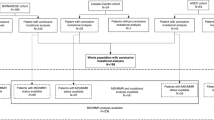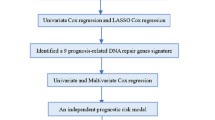Abstract
SBA classification is still based on the location of the primary tumor, without genetic information. in the current study, an extensive genetic profile of SBA, was performed in order to identify and quantify targetable alterations for a future precision medicine in SBA. Clinical-pathological information for 24 patients affected by SBA were retrospectively reviewed. Whole genome analysis of the primary tumors was performed by the FOUNDATION Cdx technology. We carried out a functional enrichment analysis of the mutated genes with BioPlanet. Integrative clustering analysis revealed three distinct subtypes characterized by different genomic alterations. Cluster 1exhibited significant correlations with MSI status, high TMB, celiac disease and Jejunual site.We defined cluster 1 as “immunological subtype” (29.2% of patients). Driver mutations in this subtype suggest that 100% of patients may benefit from immunotherapy. Enrichment analysis of cluster 2 highlighted that the main affected pathway was that of homologous DNA pairing and strand exchange (16.7% of patients). We defined this cluster as “DNA Damage Repair (DDR) like”. On the basis of these driver molecular alterations, 100% of patients could benefit from PARPi. Finally, Cluster 3 had no significant correlations with clinical-pathological characteristics (54.1% of patients). Enrichment analysis revealed that this cluster has remarkable similarities with CRA genomic profile, so we defined it as “Colon-like”. SBA is a genetically distinct tumor entity and deep mutation heterogeneity indicates that different driver genes play a role in the biology of these tumors. The identification of clusters based on genetic profile suggest the possibility to go beyond chemotherapy in several patients.




Similar content being viewed by others
Data availability
On request.
References
Siegel RL, Miller KD, Jemal A. Cancer statistics, 2016. CA Cancer J Clin. 2016;66(1):7–30.
Raghav K, Overman MJ. Small bowel adenocarcinomas–existing evidence and evolving paradigms. Nat Rev Clin Oncol. 2013;10(9):534–44.
Overman MJ, Hu CY, Kopetz S, Abbruzzese JL, Wolff RA, Chang GJ. A population-based comparison of adenocarcinoma of the large and small intestine: insights into a rare disease. Ann Surg Oncol. 2012;19(5):1439–45.
Canavan C, Abrams KR, Mayberry J. Meta-analysis: colorectal and small bowel cancer risk in patients with Crohn’s disease. Aliment Pharmacol Ther. 2006;23(8):1097–104.
Han Y, Chen W, Li P, Ye J. Association between coeliac disease and risk of any malignancy and gastrointestinal malignancy: a meta-analysis. Medicine (Baltimore). 2015;94(38):e1612.
Aparicio T, Henriques J, Manfredi S, Tougeron D, Bouché O, Pezet D, Piessen G, Coriat R, Zaanan A, Legoux JL, Terrebone E, Pocard M, Gornet JM, Lecomte T, Lombard-Bohas C, Perrier H, Lecaille C, Lavau-Denes S, Vernerey D, Afchain P, NADEGE Investigators. Small bowel adenocarcinoma: results from a nationwide prospective ARCAD-NADEGE cohort study of 347 patients. Int J Cancer. 2020;147(4):967–77. https://doi.org/10.1002/ijc.32860.
Schrock AB, Devoe CE, McWilliams R, Sun J, Aparicio T, Stephens PJ, Ross JS, Wilson R, Miller VA, Ali SM, Overman MJ. Genomic profiling of small-bowel adenocarcinoma. JAMA Oncol. 2017;3:1546–53.
Laforest A, Aparicio T, Zaanan A, Silva FP, Didelot A, Desbeaux A, Le Corre D, Benhaim L, Pallier K, Aust D, Pistorius S, Blons H, Svrcek M, Laurent-Puig P. ERBB2 gene as a potential therapeutic target in small bowel adenocarcinoma. Eur J Cancer. 2014;50(10):1740–6.
Hänninen UA, Katainen R, Tanskanen T, Plaketti RM, Laine R, Hamberg J, Ristimäki A, Pukkala E, Taipale M, Mecklin JP, Forsström LM, Pitkänen E, Palin K, Välimäki N, Mäkinen N, Aaltonen LA. Exome-wide somatic mutation characterization of small bowel adenocarcinoma. PLoS Genet. 2018;14(3):e1007200.
Ota R, Sawada T, Tsuyama S, Sasaki Y, Suzuki H, Kaizaki Y, Hasatani K, Yamamoto E, Nakanishi H, Inagaki S, Tsuji S, Yoshida N, Doyama H, Minato H, Nakamura K, Kasashima S, Kubota E, Kataoka H, Tokino T, Yao T, Minamoto T. Integrated genetic and epigenetic analysis of cancer-related genes in non-ampullary duodenal adenomas and intramucosal adenocarcinomas. J Pathol. 2020;252(3):330–42.
Shao FF, Chen BJ, Wu GQ. The functions of EZH2 in immune cells: principles for novel immunotherapies. J Leukoc Biol. 2020. https://doi.org/10.1002/JLB.1RU0520-311R.
Acknowledgements
The authors would like to thank FoundationOne.
Funding
No funding.
Author information
Authors and Affiliations
Contributions
Conception and design of the study: ACG-SC. Collection of data: All authors Analysis and interpretation of data: ACG, SC. Drafting of the manuscript: ACG, SC; Critical revision of the manuscript for important intellectual content: SC. All authors read, revised and approved the final draft.
Corresponding author
Ethics declarations
Conflict of interest
DISCLOSURE OUTSIDE THE SUBMITTED WORK: LR reports receiving consulting fees from Amgen, ArQule, AstraZeneca, Basilea, Bayer, Celgene, Eisai, Exelixis, Hengrui, Incyte, Ipsen, Lilly, MSD, Nerviano Medical Sciences, Roche, Sanofi; lectures fees from AbbVie, Amgen, Eisai, Gilead, Incyte, Ipsen, Lilly, Roche, Sanofi; travel fees from Ipsen; and institutional research funding from Agios, ARMO BioSciences, AstraZeneca, BeiGene, Eisai, Exelixis, Fibrogen, Incyte, Ipsen, Lilly, MSD, Roche.
Ethical approval
All procedures performed in studies involving human participants were in accordance with the ethical standards of the institutional and/or national research committee and with the 1964 Helsinki declaration and its later amendments or comparable ethical standards.
Informed consent
Informed consent was obtained from all individual participants included in the study. The study protocol was reviewed and approved by the local Area Vasta Emilia Nord Ethics committee (number 292; data of approve 10/10/2017) and was conformed to the ethical guidelines of the 1975 Declaration of Helsinki. All patients signed the informed consent.
Additional information
Publisher's Note
Springer Nature remains neutral with regard to jurisdictional claims in published maps and institutional affiliations.
Supplementary Information
Below is the link to the electronic supplementary material.
Rights and permissions
About this article
Cite this article
Casadei-Gardini, A., Lonardi, S., Smiroldo, V. et al. Extensive molecular reclassification: new perspectives in small bowel adenocarcinoma?. Med Oncol 38, 17 (2021). https://doi.org/10.1007/s12032-021-01468-z
Received:
Accepted:
Published:
DOI: https://doi.org/10.1007/s12032-021-01468-z




